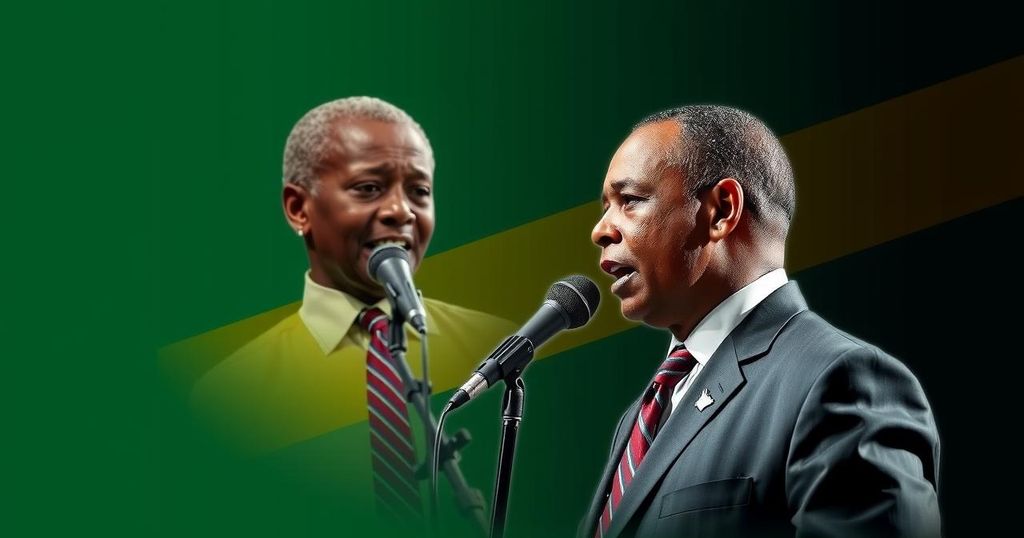Botswana’s Ruling Party Concedes Defeat, Ending Nearly 60 Years of Governance

Botswana’s ruling party, the Botswana Democratic Party (BDP), has lost its parliamentary majority in a recent election, ending a 58-year governance. The opposition coalition, Umbrella for Democratic Change (UDC), emerged victorious, advocating for socioeconomic reforms amidst widespread youth discontent due to high unemployment and economic downturns. President Mokgweetsi Masisi conceded defeat and promised to support the new administration, signaling a significant political shift in the country.
In a significant political shift, Botswana’s President Mokgweetsi Masisi acknowledged his party’s defeat on Friday following the announcement of preliminary election results, which revealed that his ruling Botswana Democratic Party (BDP) had lost its parliamentary majority in a dramatic manner, marking the end of a 58-year tenure in governance. The opposition coalition, known as the Umbrella for Democratic Change (UDC), displayed a commanding lead with over half of the constituencies reporting, positioning its leader, attorney Duma Boko, in line to become the new president. The ruling party’s decline has been attributed to escalating socio-economic frustrations, particularly among the youth, who have voiced their concerns regarding joblessness and stagnant wages. Despite Botswana’s reliance on diamond revenues, an economic downturn—exacerbated by a slump in the global diamond market—has led to a sharp decrease in growth and an increase in unemployment, which reportedly reached 28% this year. As state television updates revealed results from 41 out of the 61 constituencies, the UDC had achieved victory in 26 parliamentary seats, while the BDP managed to secure only three. Since the members of parliament elect the president, this outcome holds significant implications for the leadership of the country. In his remarks, Masisi stated, “Although I wanted to stay on as your president, I respect the will of the people and I congratulate the president-elect. I will step aside and I will support the new administration.” The atmosphere in the capital, Gaborone, was notably calm, albeit punctuated by small gatherings of opposition supporters celebrating the electoral outcome. One young student, Mpho Mogorosi, expressed her sentiments by stating, “I did not ever think I would witness this change in my life. The BDP had stayed too long in power and I am proud to be part of the people that removed them for a better Botswana.” The BDP’s loss mirrors a broader trend in southern Africa, as it becomes the second long-dominant party to suffer electoral defeat this year, following the African National Congress of South Africa, which was similarly compelled to negotiate a coalition government after three decades in power. With upcoming elections in Namibia, where the ruling SWAPO party, which has held power since 1990, is anticipated to encounter formidable opposition, the political landscape in the region appears poised for further transformation. Analyst Zaynab Hoosen from Pangea-Risk stated, “The outcome of Botswana’s elections should serve as a warning to long-time ruling parties across southern Africa and beyond that without economic progress and employment opportunities, political dominance will falter.”
This article discusses the recent parliamentary elections in Botswana, where the ruling party, the Botswana Democratic Party (BDP), conceded defeat after close to six decades in power. The election results indicated a shift in political power towards the opposition coalition, the Umbrella for Democratic Change (UDC), amidst rising socio-economic challenges, particularly affecting the youth. As Botswana has heavily relied on diamond exports, the current economic downturn has sparked concerns over employment and living standards, leading to significant voter discontent with the governing party. The outcome is part of a broader trend in southern Africa, where long-standing ruling parties have recently faced electoral defeats.
The recent elections in Botswana have led to a notable shift in the political landscape, with the UDC poised to take the presidency following the BDP’s loss of parliamentary control after a 58-year rule. President Mokgweetsi Masisi has recognized the people’s decision and pledged support for the incoming administration. This electoral outcome not only highlights the urgent socio-economic issues facing the nation but also serves as a wake-up call for established political parties across southern Africa, indicating that sustained political dominance relies on delivering economic stability and growth. The participation and sentiments of the younger generation signal a crucial change in political dynamics in the region.
Original Source: www.cnn.com







